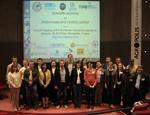Viewpoint
Welcome from Florence Fouque of the WHO-TDR on the occasion of the International Workshop
Vector-borne diseases transmitted by insect vectors such as mosquitoes occur in more than 100 countries and affect about half of the world’s population. Dengue is considered the most dangerous arboviral disease but Zika and Chikungunya show increasing prevalence and severity. Although progress has been made on vaccine development, the control of mosquito vectors of arboviruses still relies mainly on the use of chemical insecticides. Unfortunately the use of the same insecticides for more than 40 years, together with the dissemination of mosquitoes by human activities, resulted in the worldwide spread of insecticide resistance. Insecticide resistance is now recognized by the World Health Organization (WHO) and the international community as a major threat for the control of diseases transmitted by mosquitoes, and has likely contributed to the re-emergence of arboviruses worldwide.
In March 2016, TDR, the Special Programme for Research and Training in Tropical Diseases, initiated the first-ever international network to track insecticide resistance in mosquito vectors of arboviruses, in collaboration with the WHO Neglected Tropical Diseases Department (NTD/WHO). The Worldwide Insecticide-resistance Network (WIN) aims at enhancing the monitoring of insecticide resistance worldwide, filling knowledge gaps and guiding decision making for improved insecticide resistance management strategies and vector control. The network is co-led by the French Institut de Recherche pour le Développement (IRD) and the French Centre National de la Recherche Scientifique (CNRS), and involves 16 internationally recognized institutions in vector research across all continents.
The international workshop to be held in Rio de Janeiro, Brazil 5-8 December through the WIN initiative represents a formidable opportunity to identify research priorities and agree on how to develop and implement national and international plans for insecticide resistance management. The workshop targets a broad audience and will ensure discussions and exchanges among scientists, stakeholders, international agencies, and the private sector to facilitate the deployment of alternative tools for arbovirus vector control.
I look forward to the workshop raising awareness and mobilizing resources for ensuring the sustainability of the WIN resistance network, as well as promoting innovative research on topics related to insecticide resistance and mosquito control.
I wish you all a very fruitful meeting and discussion,
Sincerely yours,
Dr Florence Fouque
Welcome address from the French Ministry of Foreign Affairs in Brazil on the occasion of the International Workshop
Emerging or more traditional diseases like zika, dengue, malaria, chikungunya are considered by the World Health Organization as a priority and, therefore, researches on this field are obviously very important. A severe zika epidemic struck Brazil at a very bad time, just before the Olympic Games. Being in Rio at this period, I could see the impact of this disease on people and on the economy of the state of Rio.
I am quite sure that this workshop will be an opportunity to learn a bit more about the mosquitoes resistance to insecticide and thus an opportunity to fight these diseases.The large attendance of world-renowned experts attending this meeting will lead to a high quality work that will be done here, in Rio. I have no doubt.
It is also a pleasure to be here, with you, in this workshop because it is organized by theWorldwide Insecticide Network, an international consortium made of fifteen very famous institutions. Three of them are French :Institut de Recherche pour le Développement (IRD), Centre National de la Recherche Scientifique (CNRS) and the Institut Pasteur Guyane. Actually, these French institutions are worldwide recognized as centers of excellence and are particularly active, here, in Brazil.
I would like to empathize the very efficient Franco-Brazilian research partnerships. And, we have been developing togethermore than 30 joint research institutions. In 2012, Brazil and France signed an agreement about health in French Guyana (at the border between France and Brazil). France and Brazil have been working together since then. The French embassy in Brazilia will continue to bring strong support on this matter. Working together is one of the key to fight these worldly spread diseases.
I wish you a fulfilling workshop and a very good stay in Rio. I hope that none of you will be stung by a mosquito!
Jean-François Laborie on behalf on the French Consul, Brice Roquefeuil
WIN first meeting in Montpellier
The kick-off meeting of the WIN was held in Montpellier, from the 23rd to the 25th of May. This first meeting was an opportunity to bring together the whole network for the first time and was a great success. The WIN members agreed to start developing an international consortium for the surveillance of insecticide resistance of the vectors of arboviruses and to define the conditions for better deployment of alternative tools for vector control.
The scientific seminar on arboviruses and vector control was open to a broad audience and was an opportunity to give voices to WIN network members and communicate about the WIN initiative to a broad audience. All the talks are available on our youtube channel.
During the technical meeting, the WIN members defined the roadmap for the organization of an international symposium in Brazil, defined the content of each commissioned review and designated the Executive Committee that will steer the WIN network (7 members + Project Office).
Following the kick-off meeting, the WIN network has been mentioned in several press releases and interviews in the french media (La Marseillaise, Le Figaro, Midi Libre…).







